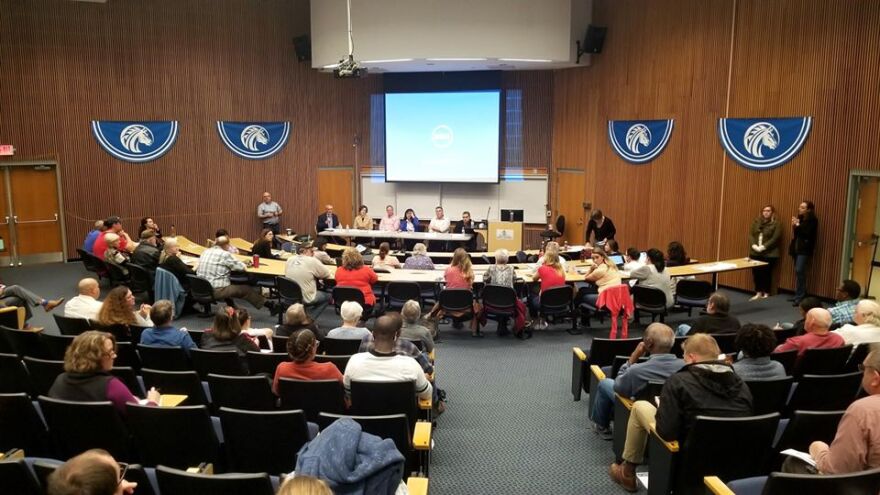PFAS contamination is about more than drinking water. At a special forum last week in Fayetteville, scientists discussed how the chemical compounds might be affecting food, livestock and wells in the area.
Dozens of citizens who live in close proximity to the Chemours facility near Fayetteville were on hand at Fayetteville State University to learn more about the contaminated air, water, and ground that surrounds them. Those area residents want answers.
“We're here tonight to see if we can gain more insight, on our property, the effects on us or effects of on animals. It seems like answers have been scarce.”
“We got to get all the information we can get. I mean right now nobody can answer nothing and nobody wants to say what's safe and what's not safe. What is the long range effect on this whole deal?”
“I'm hoping to learn some stuff tonight about, the effects of all this because I have grandchildren that live with me and my daughter, and a lot of health issues going on. So I want to know how dangerous is this stuff?”
That’s a tough question to answer. And all that is the focus of the North Carolina PFAS Testing Network. That’s NC State, Duke, UNC-Chapel Hill, UNC-Wilmington, UNC-Charlotte, ECU, and NC A&T. It’s funded by the General Assembly.
At last week’s meeting, those researchers presented a lot of data. They discussed how private wells might need to go deeper to be considered safe from contamination. Also how susceptible plants, fruits and vegetables are to PFAS. The answer? It varies.
“We collect groundwater and stream water samples; we analyze the PFAS concentrations and those samples…”
That’s David Genereux of N.C. State. His team collects groundwater and stream water samples. He’s been focused on water sources around Fayetteville and the Chemours plant.
“PFAS contamination is actually quite widespread. It shows up in all five of the tributary watersheds that we looked at in the area there - Georgia Branch, Willis Creek, and three unnamed tributaries on the east side of the Cape Fear River.”
Meanwhile the Department of Health and Human Services keeps the public informed. Virginia Guidry is the head of Occupational and Environmental Epidemiology at the DHHS. She spoke at the meeting.
“The human health studies on PFAS are being conducted by researchers at universities around North Carolina and around the United States. The Department of Health and Human Services collaborates with those researchers, but we don't conduct the studies ourselves. After research on PFAS is conducted, the Department of Health and Human Services plays the role of helping to disseminate the findings. We serve on the community advisory boards for several studies. We definitely follow the research closely so that we can help to share the results and explain the results to people…”
Researchers also detailed how artificial intelligence is being used to predict which wells are most likely contaminated. That team takes data already collected from over 1,000 wells, and plugs it in an AI diagnostic tool that drills down into the data and predicts other wells likely at risk.
In addition the N.C. State team hopes to continue its testing of the approximately 500 people enrolled and tested previously in the Wilmington and the Fayetteville areas. The plan would be to follow them for five years.
Vince Winkel, WHQR News.
Learn more about the North Carolina PFAS Testing Network

